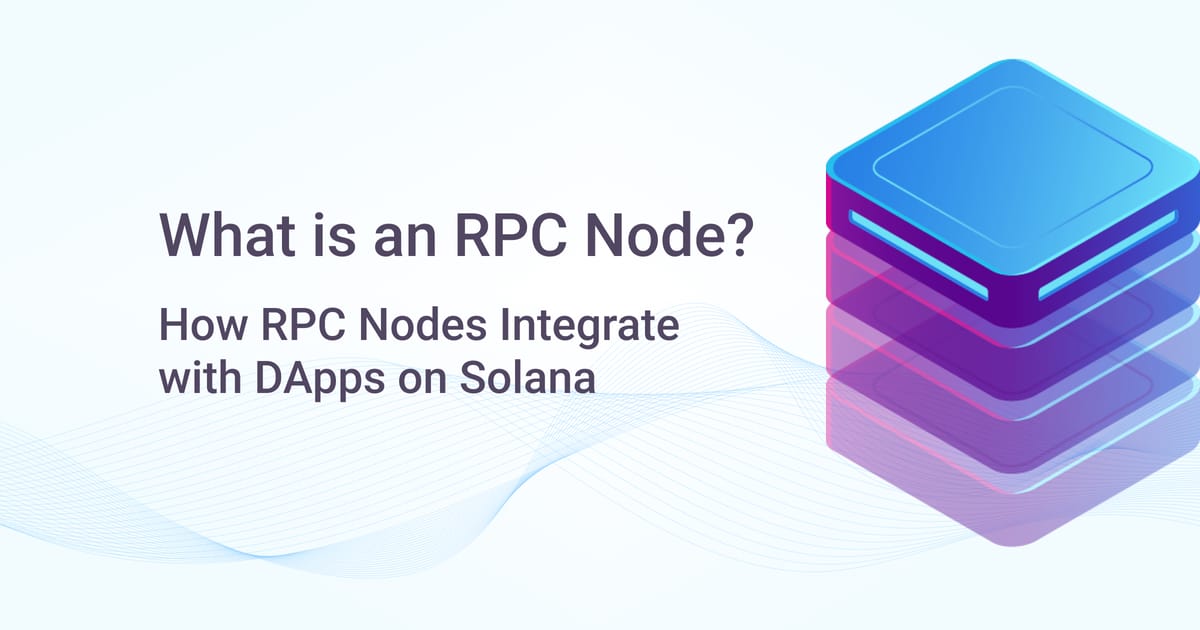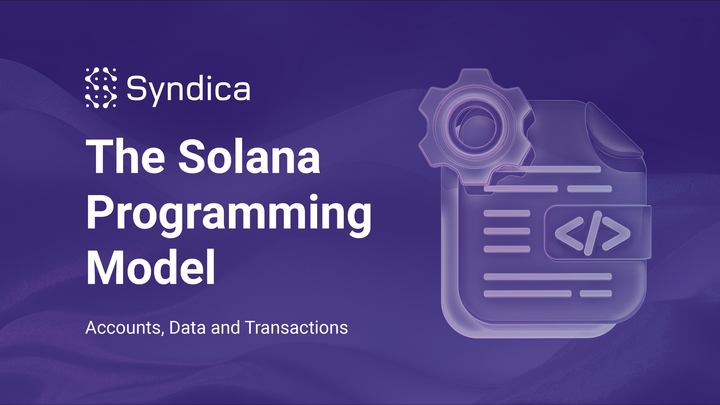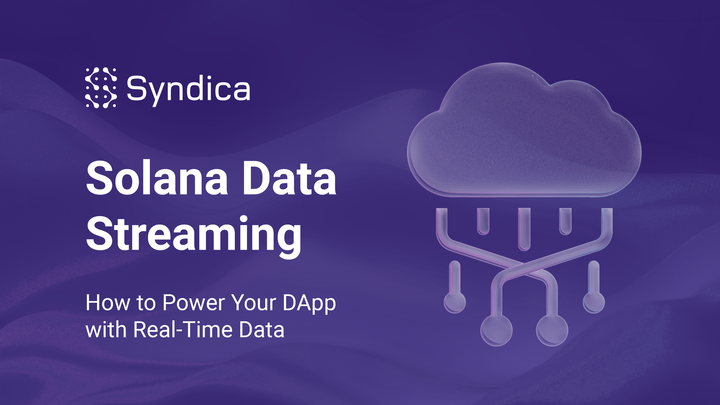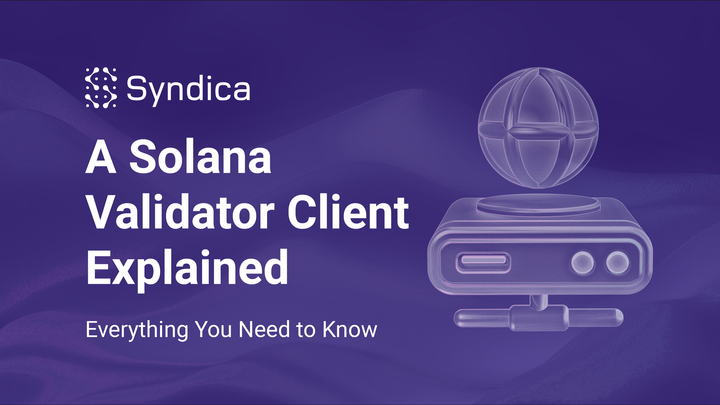What is an RPC Node?
Blockchain technology has brought about a revolutionary change in the way we handle data and transactions, introducing a new level of decentralization and security.

How RPC Nodes Integrate with DApps on Solana
Blockchain technology has brought about a revolutionary change in the way we handle data and transactions, introducing a new level of decentralization and security. A crucial component of this technology is the Remote Procedure Call (RPC) node. These nodes serve as the communication bridge between decentralized applications (DApps) and the blockchain network, enabling distributed exchange and other use cases. Understanding the role and functionality of RPC nodes is essential to leverage the benefits and use cases of Web3 technology fully.
For blockchains, an RPC node is a crucial component that enables seamless communication between various applications, systems, and services. It operates without the need for a server network, making it a vital tool for DApps to interact with. The primary role of an RPC node is to facilitate interactions with the blockchain, allowing applications to retrieve necessary information or perform actions without having to navigate the complexities of communication protocols and network topology.
A few examples from Syndica’s RPC method database (and the speed of those methods) include getBalance, getSlot, getBlock, getHealth, and getFees, although there are many more.
RPC Nodes vs. Validator Nodes on Solana
Solana RPC nodes are used in a variety of scenarios. For instance, they are integral to the construction, development, and operation of DApps (such as Star Atlas, utilizing Syndica infrastructure), which rely on RPC nodes to communicate with the blockchain network and access necessary data. They are also used in the construction, development, and deployment of smart contracts and wallets (such as the Brave Wallet, utilizing Syndica infrastructure), where they enable access to blockchain data and perform transactions on behalf of users.
On the other hand, the primary function of a Solana validator node is to participate in the consensus mechanism of the network by validating and confirming transactions or blocks that are proposed by other nodes. Validators are responsible for ensuring the integrity and correctness of transactions before they are added to the blockchain ledger. They play a crucial role in maintaining the security and decentralization of the network.
While validator nodes run the Solana consensus protocol and earn rewards for validating blocks, Solana RPC nodes function as an entry point through which Solana DApps gain access to blockchain data. For example, if a user is using a decentralized exchange (DEX), like Orca, and requests to swap one token for another, the DEX uses an RPC node to check if the user's wallet has an adequate balance for the swap. This information is then communicated to the blockchain via the RPC node. The blockchain’s validator nodes then reach a consensus regarding the validation and execute the transaction by adding a new block to the chain.
When a user's interaction within a DApp requires blockchain data, the DApp can use JSON-RPC methods to make RPC calls through the node. The node then returns the requested information to the application. Such data could encompass a spectrum of activities like sending transactions, retrieving block data, or assessing the blockchain's current state.
Security of RPC Nodes
Security is a paramount consideration when setting up an RPC Node, given its role as a communication bridge between different systems and applications. The robustness of RPC nodes is essential for seamless operations, especially as they link DApps with underlying blockchains. Therefore, it's crucial to implement measures such as firewalls, secure communication protocols (e.g., SSL/TLS), and access controls to ensure the security of the RPC Node.
However, even with these measures, it's important to note that the security of RPC nodes also depends on the careful design and implementation of the underlying code. For instance, memory-safe languages like Rust are often used to avoid many families of memory corruption-based attacks.
How RPC Nodes Affect DApps
RPC nodes are pivotal in the creation of distributed applications, the integration of legacy systems with new applications, and the processing of large data blocks. RPC nodes also play a crucial role in microservices architecture - breaking down a sizable application into smaller, self-contained components, each bearing its distinct set of responsibilities. When catering to a user request, a microservices-driven application can invoke multiple internal microservices to craft its corresponding response.
The performance of a DApp, including its throughput (the amount of data moved successfully from one place to another in a given time period), latency (the amount of time it takes data to pass from one point to another on or within a network), and uptime (the measure of system reliability, expressed as a percentage of time a computer or IT system has been operational and available) is significantly influenced by the quality of its RPC provider’s hardware, geography, and software. The geographical distribution of a DApp's node infrastructure plays a crucial role in its performance and resilience. Geographically decentralized node infrastructure provides a robust defense against any single point of failure, enhancing the overall reliability of the DApp.
The proximity of nodes to a DApp’s users directly impacts the speed of transactions. The closer the nodes are to the users, the faster their transactions can be processed and verified, leading to a smoother user experience. However, it's important to note that network topology isn't a static route, and even geographically separated nodes might operate on infrastructure owned by the same entity, thus exposing them to the same jurisdiction.
Shared vs. Dedicated RPC Nodes
The choice between shared and dedicated RPC nodes can also impact performance, scalability, maintenance cost, and security. Shared RPC nodes provide a cost-effective solution by eliminating the need for individual setups but could result in slower performance due to resource sharing. Dedicated RPC nodes offer unlimited requests and greater control, making them suitable for organizations requiring security and performance, yet they involve higher maintenance costs and technical complexity. Organizations can combine shared and dedicated nodes based on needs while seeking professional advice ensures optimal infrastructure design and implementation.
Public vs. Private RPC Endpoints
There are two types of RPC endpoints that interact with the Solana blockchain - public endpoints and private endpoints. Public endpoints are free, accessible to anyone, and do not require any authentication. They are commonly used for querying blockchain data and getting information from the Solana network. Public endpoints allow developers to access data such as transaction history, token balances, block information, and more. These endpoints are useful for building applications that need real-time data from the blockchain. Examples of public endpoints include:
https://api.mainnet-beta.solana.com: The mainnet-beta public endpoint for the Solana network.
https://api.devnet.solana.com: The devnet public endpoint for the Solana development network.
These clusters serve different use cases. Solana's Mainnet is the operational hub for processing transactions and recording token balances within the network. Devnet offers a safe space to test and develop mainnet functions without the risk of real asset involvement. Lastly, the Solana Testnet focuses on validating network performance and stability, specifically catering to validators. However, tokens within both Devnet and Testnet hold no real asset value and cannot be transferred to the Mainnet.
Private endpoints, on the other hand, require authentication to access. They are typically used for sending transactions to the blockchain, interacting with user accounts, and performing other write operations. They are also used for read operations, since they are typically commercial implementations by private companies offering a more reliable experience. To use private endpoints, you need to provide authentication credentials such as an API key or private key to sign transactions. Private endpoints offer enhanced security and control, making them suitable for applications that need to manage user accounts or perform sensitive operations on the blockchain. Here is an example with Syndica:
RPC nodes and endpoints play a crucial role in the blockchain ecosystem, particularly in the context of Solana. They facilitate communication between DApps and the blockchain, enabling a seamless and efficient exchange of information and transactions.
Syndica empowers principal enterprises and architects advancing the Solana ecosystem. In building the Cloud of Web3, we provide best-in-class RPC node infrastructure, Developer APIs, a robust end-to-end platform, and the next cutting-edge Solana client validator, ‘Sig’, written in Zig. Our team offers the dedicated support, reliability, and user-focused orientation for seamless integration with Solana, allowing you to focus solely on building your enterprise.
Power your enterprise using Syndica. Get started quickly today for free at www.syndica.io and check out our documentation here.



